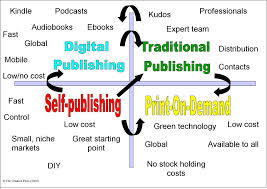When you’re new to the world of publishing, it’s easy to get confused or even intimidated by the different terms that are thrown around in the industry. We’ll lay some of the popular terms out for you so that you can refer back to simple definitions if you ever find yourself in a moment of doubt, or wondering, “Wait a second, what does that mean again?”
 Print-on-Demand (POD)
Print-on-Demand (POD)
Print-on-Demand (also referred to by the acronym “POD”) is a method of digital printing that allows for single copies of very small numbers of a book to be printed at once. POD is not a method of publishing. It is a printing method. The older method of printing is called “offset printing” and is generally not cost-effective below 1,000 copies. So, for printing runs of a book for less than 1,000 copies, POD may be an option.
Trade Publishing
In trade publishing, the author usually—but not always—gets paid an advance. The publisher carries all the financial risk in producing the book and there is no financial contribution from the author for the production of the book. More and more, however, authors do wind up spending their own money to help market the book, but this is case-by-case.
The revenue split is generally 90% to the publisher and 10% to the author and/or agent. In a traditional contract, the publisher has complete control over selling and sometimes also creative control over the book. A traditional publisher owns the rights to the book.
Self-Publishing
Self-publishing is essentially Author DIY. In the realm of self-publishing, there are no established standards or quality control. The author carries all the financial risk of their book, including but not limited to editing, production, design, and marketing.
Self-publishing is dominated by big companies who make all their money from selling services, not books. Self-published authors tend to struggle as they have no access to trade distribution channels, but these authors do entirely retain the rights to their book.
Partner Publishing / Assisted Publishing
Partner publishing, also sometimes referred to as assisted publishing, is DIY with expert help. When working with a partner publisher, the author carries all the financial risk and the publisher may or may not receive a portion of the sales revenue.
The author has ultimate control, but the publisher will be more forthcoming with quality advice than a pure self-publisher. With this method, the author also retains the rights to the book.
Vanity Press
Prior to the development of POD technology and eBooks, this was the only way to publish outside of the traditional method. With vanity presses, the author carries all the financial risk, and must also do all the selling. Vanity presses may or may not provide quality services, but the press often retains the rights to the book.
Author Services
Author services are not a method of “publishing” in and of itself. The author pays a company for expert services to prepare a book for publication, usually in preparation for self-publishing. Author services companies do not publish the book in any way, so the author retains their rights to the book.
Hybrid
This is a term that can have two meanings in the publishing industry, depending on whether it’s referring to the author or the publisher.
A hybrid author is an author who had been published by both the trade and self-publishing methods. This is becoming more and more common as self-publishing gains credibility in the industry.
Hybrid publishing is very much like trade publishing, in that the publisher has a quality-driven submissions process, and puts full professional support into the production, selling, and distribution of its books. It is different in that the publisher and the author both invest upfront in the book, and share the revenues more equitably. A clear way to determine the difference between a hybrid publisher and a self-publisher is this: does the publisher make its money on books sales (hybrid) or from author fees (self)?
Today, there are more options than ever for publishing methods. If you are writing a book, it’s good to know how you want your book to be published, and how much time and effort you want to put into the publishing process. Since authors are almost universally responsible for marketing their own books, you might want to get expert level help from an author services company or a hybrid publisher so you can put more effort into making your book visible. Just like there is a right kind of book for every reader, there is a right kind of publisher for every author. Do your research, and find the style that works best for you.